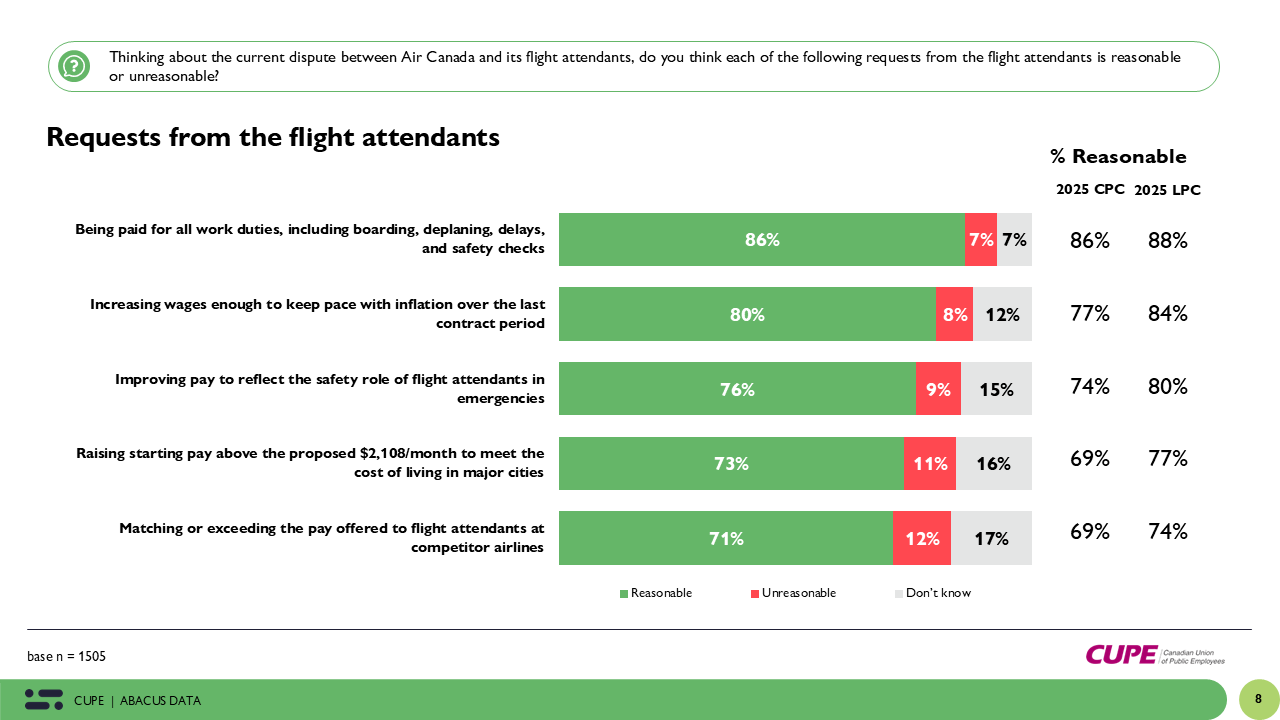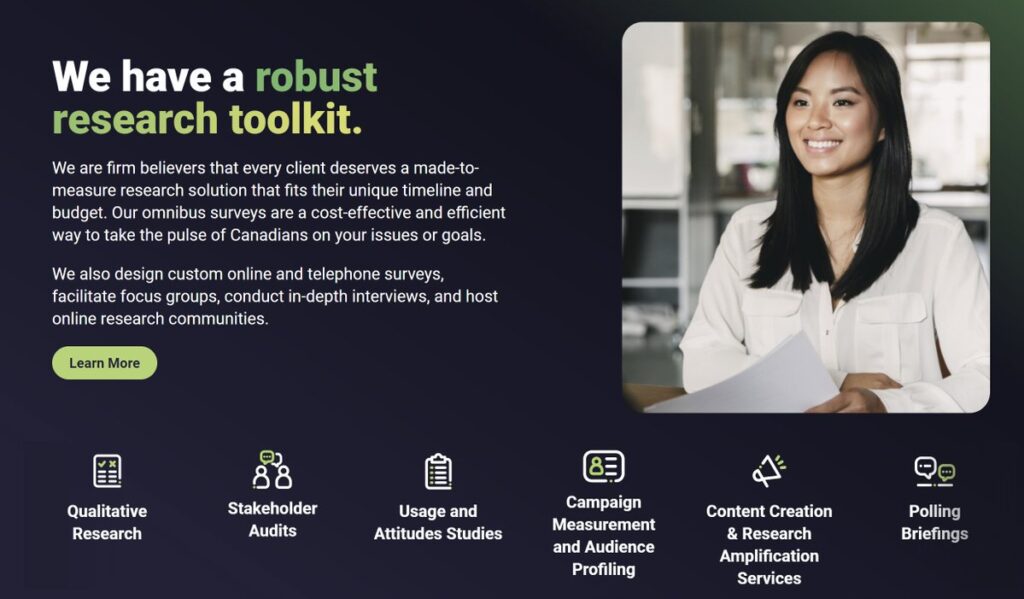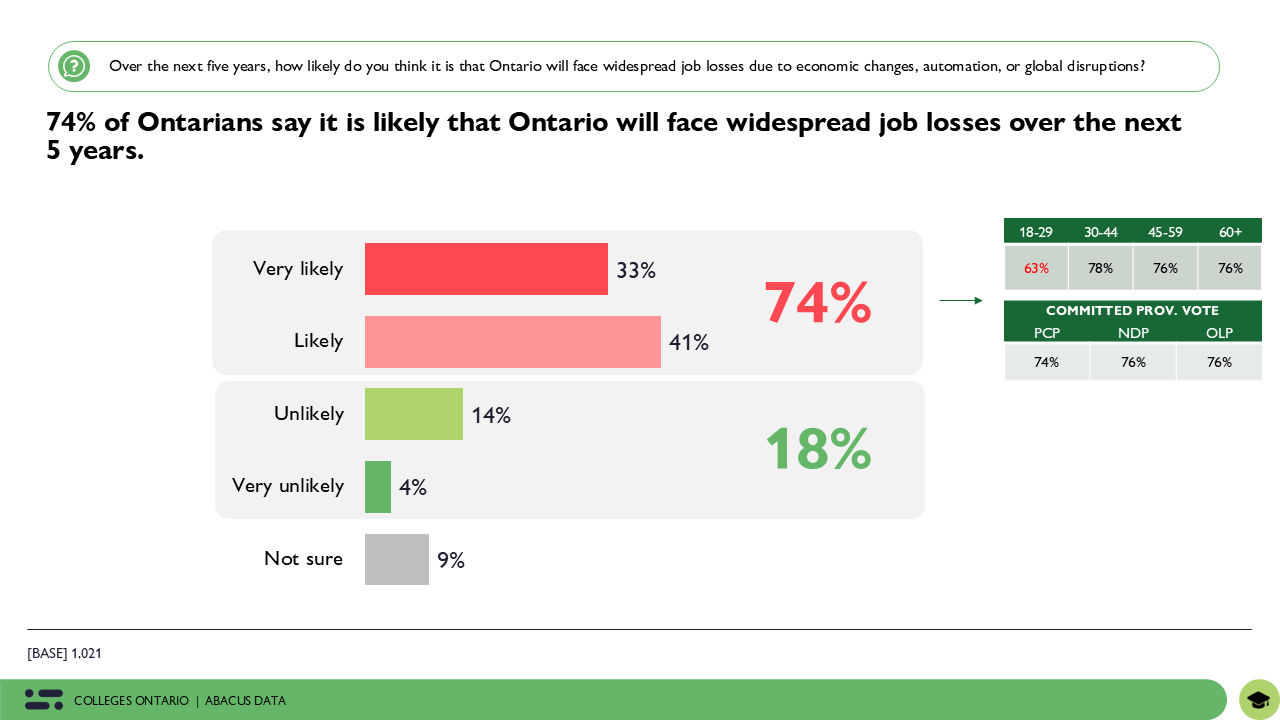Most Canadians Side with Flight Attendants in Dispute with Air Canada
August 15, 2025
From 12:00 pm ET on Thursday until 10:00 am ET Friday, Abacus Data conducted a national survey of 1,500 adults commissioned by CUPE, the union representing Air Canada’s flight attendants to understand how Canadians are feeling about the potential for a strike or lockout and the core issues in dispute.
The results reveal a strong current of public support for the flight attendants’ position. Most Canadians believe flight attendants should be paid for all aspects of their work, consider their key bargaining proposals reasonable, think Air Canada can afford to do more, and oppose federal intervention to force a return to work. Strikingly, these views cut across political lines, leaving little political advantage for the federal government that might consider legislating an end to the dispute.
Awareness of the Dispute
A clear majority of Canadians are aware of the possibility of a strike or lockout by Air Canada’s flight attendants. Just under one in six say they had not heard about it at all, while most have at least heard something. About three in ten are following the situation fairly closely and one in ten very closely.
Awareness is somewhat higher among Liberal supporters than Conservatives, and especially high among frequent flyers, a group that could be most directly impacted by service disruptions.

Sympathy for the Parties
When asked which side they feel more sympathy for, a majority of Canadians side with the flight attendants. Only a small minority say they sympathize more with the company, while a third are unsure.
Support for the flight attendants is especially strong among Liberal supporters, but even among Conservatives, more people sympathize with the workers than with the company.

Pay for All Duties
One of the clearest points of consensus in the survey is the belief that flight attendants should be paid for all work-related duties, not just when the plane is moving. Nearly nine in ten Canadians agree with this position, and there is virtually no difference between Liberal and Conservative voters.

Reasonableness of Bargaining Demands
Across a series of bargaining asks tested, large majorities of Canadians see the flight attendants’ proposals as reasonable.
- Being paid for all duties is supported by more than eight in ten.
- Raising starting pay to meet the cost of living in major cities is supported by about seven in ten.
- Increasing wages to keep pace with inflation over the last contract period has the backing of eight in ten.
- Matching or exceeding competitor airline pay is supported by about seven in ten.
- Improving pay to reflect the safety role of flight attendants in emergencies is supported by three-quarters of Canadians.
Liberal and Conservative voters are largely aligned on these issues, with only modest differences in levels of support.

Views on Wages and Affordability
When asked whether current entry-level wages are too low to live on in major cities, even after the company’s proposed raise, a majority say they are too low and should be increased. Only about one in five think the wages are fair for the work involved.
Similarly, two in three Canadians believe Air Canada can afford to pay more given its recent profits. This view is shared by 69% of Liberal supporters and 63% of Conservative supporters.

Federal Government Intervention
The public is also clear about the role the federal government should play if the dispute leads to a strike. A majority believe the government should respect the right of workers to strike, even if it causes travel disruptions. One in four think the government should intervene to prevent disruptions, and the rest are unsure.
While Conservative supporters are somewhat more likely than Liberals to favour intervention, most in both camps prefer that the government stay out of the dispute and let the parties reach their own agreement.

The Upshot
Public opinion is decisively aligned with the flight attendants. Large majorities, including those who voted for the Carney Liberals, believe their demands are reasonable, think Air Canada can afford to pay more, and support compensation for all aspects of their work. On the question of government intervention, Liberal voters are especially clear: nearly two-thirds say the federal government should respect the right to strike, even if travel is disrupted. This cross-partisan consensus, anchored by the Liberal base, leaves little political benefit in legislating an end to the dispute and considerable risk of alienating core supporters by doing so, especially since large majorities believe the flight attendants’ demands are reasonable.
Methodology
The survey was conducted with 1,500 Canadian adults from 12:00 pm ET on Thursday until 10:00 am ET Friday. A random sample of panelists were invited to complete the survey from a set of partner panels based on the Lucid exchange platform. These partners are typically double opt-in survey panels, blended to manage potential skews in the data from a single source.
The data were weighted according to census data to ensure the sample matched Canada’s population by age, gender, educational attainment, and region. Totals may not add to 100 due to rounding.
The margin of error for a comparable probability-based random sample of the same size is +/- 3.3%, 19 times out of 20.
This survey was paid for by CUPE, the union representing Air Canada’s flight attendants.
Abacus Data follows the CRIC Public Opinion Research Standards and Disclosure Requirements: https://canadianresearchinsightscouncil.ca/standards/

ABOUT ABACUS DATA
We are Canada’s most sought-after, influential, and impactful polling and market research firm. We are hired by many of North America’s most respected and influential brands and organizations.
We use the latest technology, sound science, and deep experience to generate top-flight research-based advice to our clients. We offer global research capacity with a strong focus on customer service, attention to detail, and exceptional value.
And we are growing throughout all parts of Canada and the United States and have capacity for new clients who want high quality research insights with enlightened hospitality.
Our record speaks for itself: we were one of the most accurate pollsters conducting research during the 2025 Canadian election following up on our outstanding record in the 2021, 2019, 2015, and 2011 federal elections.
Contact us with any questions.
Find out more about how we can help your organization by downloading our corporate profile and service offering.



